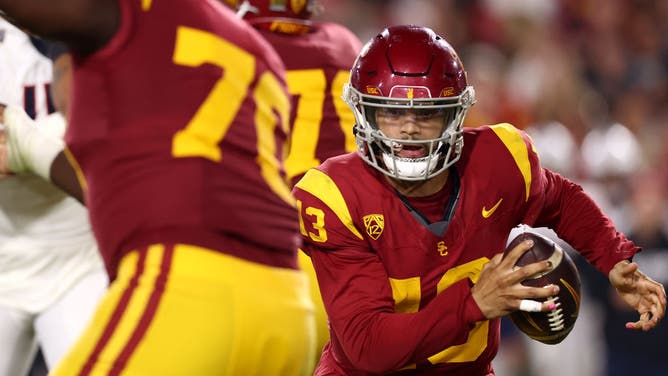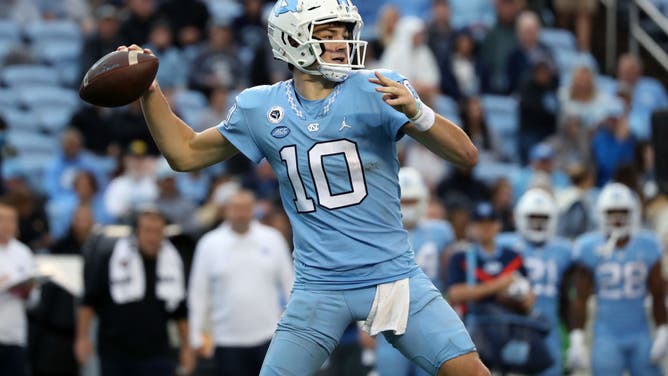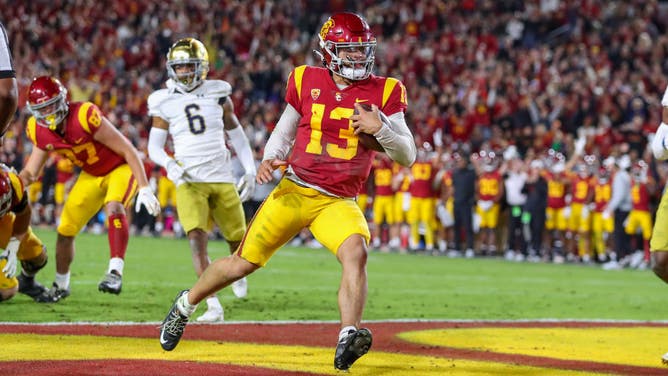Caleb Williams Hasn't Hired An Agent And That Tells Us What He Thinks Of His Draft Status
There is no greater evidence of how confident former USC quarterback Caleb Williams is of being the No. 1 selection in the April draft than the 46-page report the NFL Players Association released Wednesday showing the choices draft eligible players have made in hiring agents to represent them.
Williams, the 2022 Heisman Trophy winner and a favorite to be the top pick in the draft, is not on the report.
That means he doesn't have an agent representing him.

The Caleb Williams hype is very real. (Photo by Katelyn Mulcahy/Getty Images)
Caleb Williams Decides Against Hiring Agent
And although Williams could change his mind about going without an agent before the April 25 draft, whispers in the agent community are Williams has decided he's going into the draft without representation.
"He figures he's won the Heisman (2022), he was Player of the Year (2022), he's a great talent, and he's accounted for 120 touchdowns in three years," one NFL team personnel department source told OutKick on Wednesday. "It's obvious he thinks there's nothing he's got to worry about when the draft starts that an agent is going to solve for him.
"Plus, he's not doing it alone. He's got people. Just not an official agent at this point."
Not hiring an agent could save Williams approximately $1.15 million in fees.
So there it is.

Drake Maye responds to offers of money to transfer. (Photo by Andy Mead/ISI Photos/Getty Images)
First-Round QB Prospects Have Agents
Agents serve multiple roles and are extremely valuable in helping potential draftees manage pre-draft training, interview preparation, workouts and visits with teams. They are also invaluable in times of crisis.
That's the reason Drake Maye (CAA Football), Bo Nix (CAA Football), Michael Penix Jr. (CAA Football), and Jayden Daniels (Agency 1 Athlete Management Group) have all selected renowned representation.
But if a player doesn't foresee a crisis and his draft status is solidified within a certain lofty perch, an agent may not be as important as he or she was years ago.
That's because the rookie wage scale has significantly diminished the ability of agents to negotiate advantages in rookie contracts. The rookie wage scale is primarily tied to the salary cap. As the cap increases, rookies have gotten more money, as have veterans.
In 2023, for example, Bryce Young was a quarterback picked No. 1 and he got a fully guaranteed 4-year contract worth $37,955,074. Two years prior in 2021, Trevor Lawrence was the first overall selection. He got a fully guaranteed 4-year contract worth $36,793,486.

Bryce Young Deal Was Bigger Than Previous No. 1s
This year, depending on the exact salary cap number, which is expected to fall between $242 million and $248 million, the first overall selection is likely to get a fully guaranteed 4-year deal worth approximately $38.7 million to $39.3 million.
Total salaries in rookie deals are restricted to signing bonus, base salary, roster bonus, reporting bonus, workout bonus and select incentives. The type of salary escalators and incentives that used to cause extended and sometimes confrontational negotiations and were responsible for ballooning salaries at the top of draft are now prohibited under the rookie wage scale.
Indeed, most picks only have signing bonuses and base salaries in their deals.
And while agents can negotiate the payment schedule of the signing bonus, the traditional fight over offsets is a battle that has mostly gone to the team side. An offset clause allows a team to reduce the guaranteed money owed to a player when he is released by the amount of his new deal with another team.
Agents can also try to move the needle on the language outlining the voiding of salary guarantees. But as the NFLPA offers players without agents advice on most negotiating points, it is possible Williams feels he is not in danger of losing any advantages.

USC quarterback Caleb Williams. (Getty Images)
Can An Agent Help Prospect's Draft Status?
There is, of course, the public relations part of the agent's job. If Williams continues without an agent, he may deal with the pre-draft narratives that often befall most top-of-the-draft prospects. Agents are deft at pushing back against narratives from the so-called unarmed scout sources.
But players with agents are often targets of such narratives as much or more as players without agents.
There's also a myth that agents can convince teams to take their clients over someone else. Not having an agent, some believe, puts a player at a disadvantage against a player with an agent.
"Such horse---t," the personnel department source said. "The only time the agent determines whether we pick a guy or not is maybe later in the draft in the old days when we didn't feel like dealing with some jerk. If I ever work for a team that makes a pick in any way swayed by an agent's advice, you'll know it because there will be reports I slit my wrists."